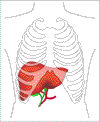What is Viral Hepatitis?

“Hepatitis” means inflammation of the liver. The liver is a vital organ that processes nutrients, filters the blood, and fights infections. When the liver is inflamed or damaged, its function can be affected. Heavy alcohol use, toxins, some medications, and certain medical conditions can cause hepatitis. However, hepatitis is most often caused by a virus. In the United States, the most common types of viral hepatitis are Hepatitis A, Hepatitis B, and Hepatitis C.
Hepatitis A |
Hepatitis B |
Hepatitis C |
||||
|---|---|---|---|---|---|---|
| What causes it? | Hepatitis A virus | Hepatitis B virus | Hepatitis C virus | |||
| Number of U.S. cases |
|
|
|
|||
|
Key facts |
|
|
|
|||
| How long does it last? |
Hepatitis A can last from a few weeks to several months. |
Hepatitis B can range from a mild illness, lasting a few weeks, to a serious life-long or chronic condition. More than 90% of unimmunized infants who get infected develop a chronic infection occurs, whereas 6%–10% of older children and adults who get infected develop chronic Hepatitis B. |
Hepatitis C can range from a mild illness, lasting a few weeks, to a serious life-long infection. Most people who get infected develop chronic Hepatitis C. |
|||
| How is it spread? |
Hepatitis A is spread when a person ingests fecal matter—even in microscopic amounts—from contact with objects, food, or drinks contaminated by feces or stool from an infected person. |
Hepatitis B is primarily spread when blood, semen, or certain other body fluids from a person infected with the Hepatitis B virus - even in microscopic amounts - enters the body of someone who is not infected. The Hepatitis B virus can also be transmitted from:
|
Hepatitis C is spread when blood from a person infected with the Hepatitis C virus - even in microscopic amounts - enters the body of someone who is not infected. This can happen through multiple ways including:
|
|||
| Who should be vaccinated? |
|
|
There is no vaccine available for Hepatitis C. |
|||
| How serious is it? |
|
|
|
|||
| Treatment |
Supportive treatment for symptoms |
Acute: No medication available; best addressed through supportive care Chronic: Regular monitoring for signs of liver disease progression; some patients are treated with antiviral drugs |
Acute: Antivirals and supportive care Chronic: Regular monitoring for signs of liver disease progression; Some patients are treated with antiviral drugs including new medications that can cure Hepatitis C and offer shorter length of treatment and increased effectiveness. |
|||
| Who should be tested? |
Testing for Hepatitis A is not routinely recommended.
|
|
|
|||
| Symptoms: |
Many people with hepatitis do not have symptoms and do not know they are infected. If symptoms occur with an acute infection, they can appear anytime from 2 weeks to 6 months after exposure. Symptoms of chronic viral hepatitis can take decades to develop. Symptoms of hepatitis can include: fever, fatigue, loss of appetite, nausea, vomiting, abdominal pain, dark urine, grey-colored stools, joint pain, and jaundice. |
|||||
- Page last reviewed: May 26, 2016
- Page last updated: May 26, 2016
- Content source:


 ShareCompartir
ShareCompartir